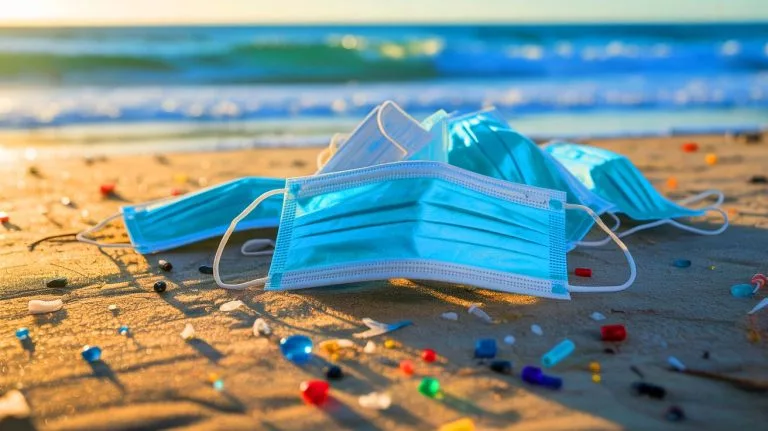| IN A NUTSHELL |
|
The COVID-19 pandemic fundamentally altered daily life, and face masks became a ubiquitous symbol of this new reality. However, as the world moves forward, an emerging environmental crisis is unfolding. A recent study from Coventry University has unveiled that disposable masks, once vital for public health, are now potential environmental hazards. These masks are transforming into microplastic pollutants, leaching chemicals into ecosystems. The scale of this issue is staggering, with billions of masks discarded worldwide, posing risks not just to the environment but potentially to human health. The findings prompt a reevaluation of disposable mask use and disposal.
Understanding the Microplastic Menace
Microplastics have become a major environmental concern in recent years, and disposable masks are now contributing significantly to this issue. The Coventry University study revealed that even unused masks shed microplastics, posing threats to ecosystems. Researchers simulated real-world conditions by immersing masks in ultra-pure water, finding that they released microplastics and chemicals despite minimal contact.
Filtering facepieces were found to be particularly problematic, emitting three to four times more microplastics than standard surgical masks. These particles, often smaller than 100 micrometers, are primarily composed of polypropylene. This material is highly resistant to degradation, allowing it to persist in the environment for decades. As these microplastics accumulate, they pose a threat to marine life and, eventually, the human food chain.
Given their persistence, these materials could alter entire ecosystems, leading to a cascade of ecological impacts. The study underscores the importance of addressing the microplastic emissions from masks to safeguard environmental health.
Unseen Chemical Hazards
In addition to microplastics, the study identified harmful chemical additives in masks, such as Bisphenol B. This chemical is known to disrupt hormones and can have detrimental effects on aquatic life. The potential for these chemicals to enter waterways and contaminate drinking water sources raises further concerns.
Scientists warn that the full implications of these chemical leachings are not yet fully understood. The combination of microplastics and chemical additives could have more severe effects than currently anticipated. The study highlights the urgent need for more research into the long-term environmental and health impacts of these pollutants.
As society continues to grapple with the consequences of disposable mask usage, it becomes clear that a comprehensive understanding of their environmental impact is crucial for developing sustainable solutions.
A Global Plastics Crisis
The pandemic resulted in the global use of an estimated 129 billion masks each month. Many were discarded carelessly, contributing to a mounting plastic waste crisis. These masks join a growing volume of unmanaged waste, exacerbating the global plastics problem.
Experts suggest that the development of sustainable alternatives, such as biodegradable masks, should be prioritized. Public awareness about the environmental dangers of single-use protective gear is equally important. This awareness can drive behavior changes and promote responsible usage and disposal practices.
Dr. Bogush, a lead researcher in the study, emphasized the need for safer mask designs and improved waste management systems. Such measures are essential to mitigate the long-term damage caused by the improper disposal of disposable masks.
Rethinking Mask Use and Disposal
The findings from the Coventry University study call for a reevaluation of how society uses and disposes of disposable masks. While masks were instrumental in protecting public health during the pandemic, their environmental impact cannot be overlooked.
Policymakers and manufacturers are urged to consider more sustainable mask designs and to implement effective waste management strategies. This includes investing in research and development for biodegradable materials and encouraging the public to adopt reusable mask options.
The ongoing challenge is to balance public health needs with environmental sustainability. As we move forward, it is imperative to develop solutions that protect both human health and the planet.
The environmental impact of disposable masks is a pressing issue that demands attention. As microplastics and chemical pollutants continue to accumulate, the need for sustainable solutions becomes more urgent. How will society address the dual challenges of public health and environmental sustainability in the face of this growing crisis?
Did you like it? 4.5/5 (24)








Wow, I had no idea masks could be so harmful to the environment! 😲 Thanks for sharing this info.
Is there any way to recycle these masks to reduce microplastic pollution? ♻️
Are there any specific brands of masks that are more eco-friendly, or are they all the same?
Wow, didn’t expect masks to be a microplastic culprit. 😮
What can individuals do to reduce the impact of microplastics from masks?
How do we balance the need for masks with environmental concerns?
Honestly, this is terrifying. We traded one crisis for another. 😞
How do reusable masks compare in terms of environmental impact?
So the masks were protecting us but poisoning the planet? Talk about a bittersweet irony.
Is it possible to recycle these disposable masks in any way?